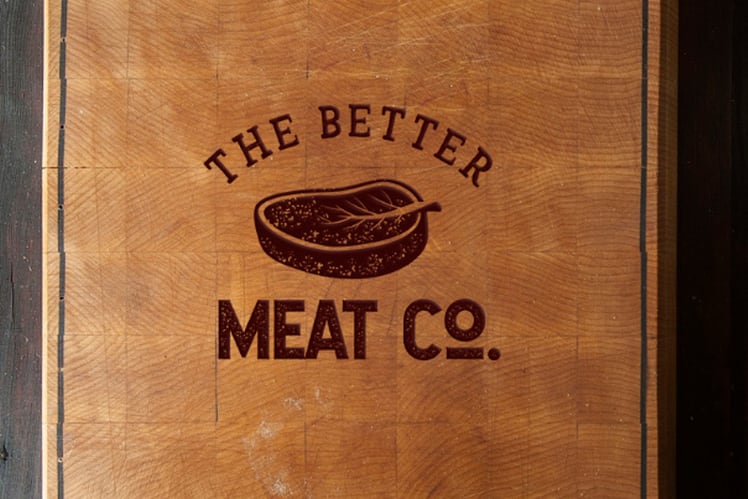Co-founded by Paul Shapiro (CEO), author of the best seller, ‘Clean Meat: How Growing Meat Without Animals Will Revolutionize Dinner and the World;’ food scientist Adam Yee; and finance and consulting industry veteran Joanna Bromley, Better Meat Co has raised $800,000 in a pre-seed round and is aiming to commercialize its first product – a blend of wheat protein, mushroom, pea fiber and umami extracts dubbed ‘Albina 100’ - before the end of the summer.
Albina 100 – which is shelf-stable and “looks a bit like a packet of croutons" - delivers a taste and texture you cannot achieve by simply buying its component parts and mixing them into a burger or hotdog, claimed Yee, a former product developer for Isagenix and LeClerc Foods, and host of the My Food Job Rocks podcast.
“It’s a proprietary process, so I can’t go into detail, but if you just took those ingredients as they are and added them to a meatball, you’d have a very gummy-like experience, and that’s not what we’re delivering,” added Yee, who said Albina 100 was specifically formulated for ground pork products including sausages, meatballs, chorizo, and dumplings, with the next wave of products set to target beef, chicken, and other meat products.
Blended options are gaining traction
While on the face of it, a plant-meat combo might seem like the worst of both worlds – it’s not all meat, which may put off some meat lovers, but it’s not all plants, which automatically excludes vegans and vegetarians – the success of the blended burger project (which promotes burgers with 75% meat and 25% mushrooms), suggests otherwise, said Yee.
Indeed, foodservice companies are increasingly open to blended meat products for health reasons (they have less saturated fat and fewer calories), environmental reasons (they have a lower carbon footprint, and many companies have targets to meet on this front), or simply the novelty factor (reducing meat is a hot trend), said Yee.
And by using other plants as well as mushrooms, he said, you can deliver more protein and improved functionality, such that the overwhelming majority (about 80%) of consumers that have tried Better Meat Co’s wares in blind taste tests actually preferred meatballs made with 30% plants.
As Tyson’s recent investments in plant-based and cell-cultured meat demonstrates, meanwhile, ‘meat’ companies are starting to think of themselves more as protein companies, and recognize that brands developing cell-cultured meat products, plant-based products, and blended products, all share the same goal: to reduce our reliance on industrialized animal agriculture to produce protein, he added.
Better Meat Co promises to:
- Enhance the taste and texture of meat products
- Improve the health profile of meat products by reducing calories, saturated fat, and cholesterol (blending Albina 100 at 30% into ground pork maintains similar protein levels while reducing saturated fat and cholesterol by 30% each, and calories by 12%).
- Improve the environmental footprint of meat products, helping firms achieve corporate sustainability goals
- Offer cost-competitive prices
We’re trying to be cost competitive with the meat we are replacing
Bromley, whose resumé includes stints as an investment banker at Goldman Sachs and a management consultant at Bain & Co, said the time was right to tap into the ‘blended’ trend.
“Look at the Sonic Signature Slinger [a blended burger with 25% cooked mushrooms now available nationwide], and what Sodexo is doing [the foodservice giant recently introduced a beef mushroom blend dubbed ‘The Natural’ now rolling out into burgers, lasagna and chili in workplaces, universities and schools across the country].
"Our product is taking this to the next level. You know with a mushroom burger that there’s mushroom in there, you can see it, you can taste it. But in our case, you can’t actually tell the difference. We’re replacing protein with protein.”
Asked about the business case, Bromley said: “From our perspective, if you can make the unit economics work, you can make the business work, and so ultimately we’re trying to be cost competitive with the meat we are replacing, which is why it made sense to start with pork [as opposed to a cheaper protein such as chicken]. Many of the foodservice companies we are talking to are also under pressure to reduce their environmental footprint, and so far the feedback has been very positive.”
"If I were in the horse carriage industry, I hope I'd invest in Henry Ford. Plant-based proteins are on the upswing, and The Better Meat Co. can help serve as a bridge to further mainstream them."
Glenn Hickman, CEO of Hickman's Egg Ranch, and a 'major investor' in The Better Meat Co
Stealth health?
Shapiro explained: “I see this at first as a foodservice play although we would welcome interest from CPG companies, obviously. We’re making next-generation plant-based, soy-free formulas that are precision-oriented to perfectly mimic meat and blend into different types of meat, from crab cakes to chicken nuggets."
Some companies are keen to actively promote the plant-based component in blended products, especially in environments such as university cafeterias or tech company foodhalls, he said, while others are interested in adopting a stealth health strategy.
“If you tell some people that a product has less saturated fat, they think it has less taste [recent research by Datassential also suggests that focusing on deliciousness – rather than health credentials or saving the planet – has proved the most successful marketing strategy for the new wave of plant-based burgers].
“You get better acceptance when you talk about how juicy your burger is or how umami it is as opposed to talking about how it has less fat or some better environmental footprint.”
Asked about IP, he said: "As with much of the food industry it's more about trade secrets than filing patents, but we're doing a combination of things including extrusion that really give us an advantage."
- Better Meat Co is one of six startups in the plant-based and clean meat arena that will pitch in front of leading venture capital firms and food industry and media executives at the Good Food Institute’s Good Food Conference at UC Berkeley on Sept 6.




